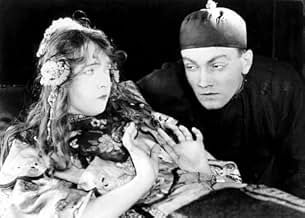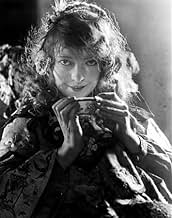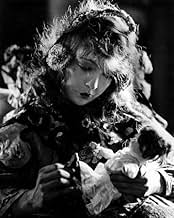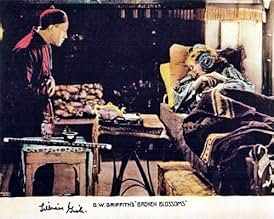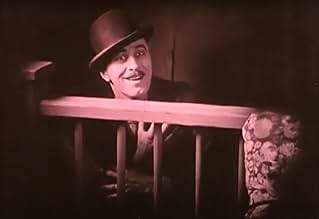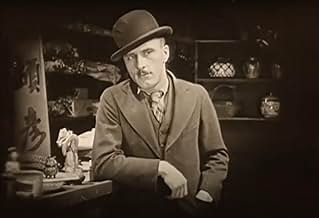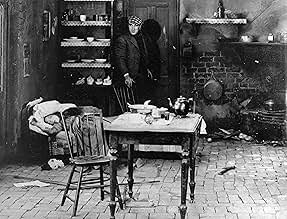IMDb RATING
7.2/10
12K
YOUR RATING
A frail waif, abused by her brutal boxer father in London's seedy Limehouse District, is befriended by a sensitive Chinese immigrant with tragic consequences.A frail waif, abused by her brutal boxer father in London's seedy Limehouse District, is befriended by a sensitive Chinese immigrant with tragic consequences.A frail waif, abused by her brutal boxer father in London's seedy Limehouse District, is befriended by a sensitive Chinese immigrant with tragic consequences.
- Director
- Writers
- Stars
- Awards
- 1 win total
Lillian Gish
- Lucy - The Girl
- (as Miss Lillian Gish)
Richard Barthelmess
- Cheng Huan - The Yellow Man
- (as Mr. Richard Barthelmess)
Edward Peil Sr.
- Evil Eye
- (as Edward Peil)
Ernest Butterworth
- Secondary Role
- (uncredited)
Frederic Hamen
- Secondary Role
- (uncredited)
Wilbur Higby
- London Policeman
- (uncredited)
Man-Ching Kwan
- Buddhist Monk
- (uncredited)
Bobbie Mack
- Ringside Employee
- (uncredited)
Moy Ming
- Minor Role
- (uncredited)
Steve Murphy
- Fight Spectator
- (uncredited)
George Nichols
- Police Constable
- (uncredited)
Karla Schramm
- Burrows' Girlfriend
- (uncredited)
Bessie Wong
- Girl in China
- (uncredited)
- Director
- Writers
- All cast & crew
- Production, box office & more at IMDbPro
7.211.6K
1
2
3
4
5
6
7
8
9
10
Featured reviews
SMALL SCALE DOESN'T HALT GRIFFITH'S SUCCESS
Following the elaborate spectacles that were "The Birth of a Nation" and "Intolerance" D.W. Griffith seemed to have the formula intact for success. With broad sets, hundreds of extras, three hour epics, and tales told over years and even millenniums in the case of "Intolerance," the 90 minute "Broken Blossoms" would seem to have a handicap of sorts. It is but a simple morality tale involving three people that goes horribly awry. But true to Griffith form it works...and it works nearly perfect.
Gone are the visions of what formed countries, what creates intolerance, and the climaxes involving hundreds of people. "Broken Blossoms" is a mere story of forbidden love if such occurrences can actually be called "mere." And although the sets used to portray the foggy gloom and forbidding darkness of London's Limehouse district were indeed expensive, this was a film carried by its only three stars and one that relies totally on the telling of a story.
Richard Barthelmess plays Cheng Huan, a Buddhist missionary who now takes residence in Limehouse. His original intentions, to help the violent Anglo-Saxons understand pacifism, are subverted by his opium addiction. He runs a small shop in the fog of the city and it becomes his own depressed microcosmic world. The stunning Lilian Gish, who seemingly has no bounds as an actress or as an object of feminine beauty, plays Lucy, the daughter of an abusive alcoholic boxer. Donald Crisp plays this part so well that the lack of sound does not inhibit the volume of cruelty he enforces on his only daughter, nor our ability to feel her level of sheer pain and suffering.
Although all three of them may technically may be viewed as broken and products of their own respective worlds, when those worlds clash with each other and tragedy seems more likely, it is Gish who steals the show. Especially under Griffith's direction. And while Griffith may have already given the cinema more than its fair share of technological nuances with his first two features, he still manages to find subtle bits of direction that affect one's viewing of this sordid triangle: Gish's physical inability to smile and her seeking of solitude in something as simple as a flower cannot be emphasized enough as the film goes along.
Political historians may note that Griffith is up to his usual tricks of racism as it is portrayed in the Asian who is played by the white Barthelmess but this is unfounded. If anything, his character is uplifting, or at least attempts to be. One gets the feeling that his race does not impact the story's eventual ending despite what Crisp may bellow while drunk. Crisp's pleasure comes from Gish's pain and anyone, regardless of race, that tried to interfere would not have caused any sort of behavior change. Of course the Asian stereotypes of pacifism, opium addiction, and flowery imagery are played up to some degree but one can hardly argue over the degree of truth in them more than the story's beginning that sees drunken sailors duking it out at the shipyards over next to nothing. And it allows the film to have its ironic coda to boot.
In more detailed film classes, "Broken Blossoms" will get its share of time but overall Griffith will always have "Birth of a Nation" and "Intolerance" printed boldly next to his name with this film being more of a footnote. That is unfortunate because it stands up well for the time, involves excellent early character acting, and hits us closer to home...and to our heart.
The nutshell: I still believe this should be required viewing. The bigness of Griffith may be gone but he has aptly replaced it by creating atmosphere both in terms of environment and in people. The small story of insignificant lives trapped by their own measures suits Griffith, Gish, and Crisp extremely well...9/10.
Gone are the visions of what formed countries, what creates intolerance, and the climaxes involving hundreds of people. "Broken Blossoms" is a mere story of forbidden love if such occurrences can actually be called "mere." And although the sets used to portray the foggy gloom and forbidding darkness of London's Limehouse district were indeed expensive, this was a film carried by its only three stars and one that relies totally on the telling of a story.
Richard Barthelmess plays Cheng Huan, a Buddhist missionary who now takes residence in Limehouse. His original intentions, to help the violent Anglo-Saxons understand pacifism, are subverted by his opium addiction. He runs a small shop in the fog of the city and it becomes his own depressed microcosmic world. The stunning Lilian Gish, who seemingly has no bounds as an actress or as an object of feminine beauty, plays Lucy, the daughter of an abusive alcoholic boxer. Donald Crisp plays this part so well that the lack of sound does not inhibit the volume of cruelty he enforces on his only daughter, nor our ability to feel her level of sheer pain and suffering.
Although all three of them may technically may be viewed as broken and products of their own respective worlds, when those worlds clash with each other and tragedy seems more likely, it is Gish who steals the show. Especially under Griffith's direction. And while Griffith may have already given the cinema more than its fair share of technological nuances with his first two features, he still manages to find subtle bits of direction that affect one's viewing of this sordid triangle: Gish's physical inability to smile and her seeking of solitude in something as simple as a flower cannot be emphasized enough as the film goes along.
Political historians may note that Griffith is up to his usual tricks of racism as it is portrayed in the Asian who is played by the white Barthelmess but this is unfounded. If anything, his character is uplifting, or at least attempts to be. One gets the feeling that his race does not impact the story's eventual ending despite what Crisp may bellow while drunk. Crisp's pleasure comes from Gish's pain and anyone, regardless of race, that tried to interfere would not have caused any sort of behavior change. Of course the Asian stereotypes of pacifism, opium addiction, and flowery imagery are played up to some degree but one can hardly argue over the degree of truth in them more than the story's beginning that sees drunken sailors duking it out at the shipyards over next to nothing. And it allows the film to have its ironic coda to boot.
In more detailed film classes, "Broken Blossoms" will get its share of time but overall Griffith will always have "Birth of a Nation" and "Intolerance" printed boldly next to his name with this film being more of a footnote. That is unfortunate because it stands up well for the time, involves excellent early character acting, and hits us closer to home...and to our heart.
The nutshell: I still believe this should be required viewing. The bigness of Griffith may be gone but he has aptly replaced it by creating atmosphere both in terms of environment and in people. The small story of insignificant lives trapped by their own measures suits Griffith, Gish, and Crisp extremely well...9/10.
A Well-Acted, Memorable Story
With some excellent acting performances and an interesting, memorable story, "Broken Blossoms" is one of the better pictures of the late 1910s, and it has held up rather well despite a couple of obvious signs of age. It would be hard to top Lillian Gish's performance as Lucy in any era, and Richard Barthelmess turns in a purposefully restrained and surprisingly effective performance in a role that was far from easy.
The story ties together several weighty themes, and most of them are still pertinent. This is the kind of movie that is sometimes considered to be dated, yet in terms of the main conflicts and struggles that the characters face, there are probably fewer differences between 1919 and 2004 than many might wish there to be. With material like this, it is also easy to allow it to become labored or heavy-handed. As it is, the tone is somber and austere throughout, yet most of the time this is in a thoughtful way.
Since Griffith's work is still so well-known and meets with such widely varying responses, it can sometimes be hard to evaluate his movies individually, without reference to the rest of his filmography. The story here is unusual enough in itself, with the different races and religions of the characters and the implied images represented by each of them. Each character is rather quickly defined as good or bad - a common state of affairs in Griffith movies - and as a result the story is told in a way that reflects that presumption, for better or for worse.
What is hard to deny is that the story and characters will stick with you afterwards. The impression that it leaves is not an entirely happy one, but the movie successfully evokes the humanity of all involved, which is a not unworthy goal and a not insignificant achievement.
The story ties together several weighty themes, and most of them are still pertinent. This is the kind of movie that is sometimes considered to be dated, yet in terms of the main conflicts and struggles that the characters face, there are probably fewer differences between 1919 and 2004 than many might wish there to be. With material like this, it is also easy to allow it to become labored or heavy-handed. As it is, the tone is somber and austere throughout, yet most of the time this is in a thoughtful way.
Since Griffith's work is still so well-known and meets with such widely varying responses, it can sometimes be hard to evaluate his movies individually, without reference to the rest of his filmography. The story here is unusual enough in itself, with the different races and religions of the characters and the implied images represented by each of them. Each character is rather quickly defined as good or bad - a common state of affairs in Griffith movies - and as a result the story is told in a way that reflects that presumption, for better or for worse.
What is hard to deny is that the story and characters will stick with you afterwards. The impression that it leaves is not an entirely happy one, but the movie successfully evokes the humanity of all involved, which is a not unworthy goal and a not insignificant achievement.
"With perhaps a whiff of the lilied pipe still in his brain..."
Turning away from the epic scale of his quintessential movies, Birth of a Nation and Intolerance, director D. W. Griffith turned to an altogether smaller and more intimate story in 1919. Instead of telling a vast tale spanning millennia and featuring a cast of thousands, he focused his attention on the tragic interplay between just three people: a Chinese immigrant to London (Richard Barthelmess), a young waif with whom he develops a brief but touching relationship (Lillian Gish), and her brutish father (Donald Crisp). It's been suggested this was another sop by Griffith to those who had accused him of being a racist due to the content of BoaN although, while Bathelmess' Chinese immigrant is a completely sympathetic character, the thoughtless racist attitudes that were commonplace back then are still very much in evidence. For example, the movie's secondary title is 'The Yellow Man and the Girl', and during a tender love scene, Gish's Lucy says to him: "Why are you so good to me, Chinky?" which tends to break the mood just a tad.
Griffith's trademark use of tiny gestures and changes of expression is very much in evidence in the performances of Barthelmess and Gish, while Crisp, who is barely recognisable as the kindly patriarch of countless 40s flicks, paints a broader picture of the loutish Battling Burrows. This counterpoint between screen father and daughter works well, stressing the fragile nature of Gish's waif, while emphasising the misery of her dependence upon her uncouth father. Barthelmess, meanwhile spends much of his time gazing miserably at the bleakness of the world around him as his character tries to lose himself in a haze of opium after failing to spread the word of peace. Chen seems to be moving through a dream for much of the film, passively allowing himself to be buffered by the world, and only shaking himself from his torpor when Lucy almost literally falls at his feet. This scene, in which Lucy and Chen first meet, is wonderfully atmospheric and beautifully framed and is, strangely, the prelude to the film's weakest segment. Having set the scene beautifully and created a great atmosphere, Griffith allows proceedings to slip into melodrama. While Battling's discovery of Lucy's new friendship is melodrama of the most Victorian kind, the relationship between the two potential lovers goes nowhere which, while perhaps true to the film's title, leaves the story struggling for momentum. Lucy enjoys a few hours of being spoiled by Chen the first time in her life that she ever has been, but there is very little interaction between them, and Chen's apparent consideration of forcing himself on Lucy before finally kissing her sleeve really doesn't ring true at all. In fact, the scene looks as if it were added almost as an afterthought to inject a little suspense.
Nevertheless, BROKEN BLOSSOMS is another example of one of the world's greatest directors operating at somewhere close to the top of his game. In another few years, Griffith's Victorian viewpoint would look horribly outdated to the Roaring Twenties crowd. There were still more classics to come, but in terms of technical and creative accomplishment he had already peaked.
Griffith's trademark use of tiny gestures and changes of expression is very much in evidence in the performances of Barthelmess and Gish, while Crisp, who is barely recognisable as the kindly patriarch of countless 40s flicks, paints a broader picture of the loutish Battling Burrows. This counterpoint between screen father and daughter works well, stressing the fragile nature of Gish's waif, while emphasising the misery of her dependence upon her uncouth father. Barthelmess, meanwhile spends much of his time gazing miserably at the bleakness of the world around him as his character tries to lose himself in a haze of opium after failing to spread the word of peace. Chen seems to be moving through a dream for much of the film, passively allowing himself to be buffered by the world, and only shaking himself from his torpor when Lucy almost literally falls at his feet. This scene, in which Lucy and Chen first meet, is wonderfully atmospheric and beautifully framed and is, strangely, the prelude to the film's weakest segment. Having set the scene beautifully and created a great atmosphere, Griffith allows proceedings to slip into melodrama. While Battling's discovery of Lucy's new friendship is melodrama of the most Victorian kind, the relationship between the two potential lovers goes nowhere which, while perhaps true to the film's title, leaves the story struggling for momentum. Lucy enjoys a few hours of being spoiled by Chen the first time in her life that she ever has been, but there is very little interaction between them, and Chen's apparent consideration of forcing himself on Lucy before finally kissing her sleeve really doesn't ring true at all. In fact, the scene looks as if it were added almost as an afterthought to inject a little suspense.
Nevertheless, BROKEN BLOSSOMS is another example of one of the world's greatest directors operating at somewhere close to the top of his game. In another few years, Griffith's Victorian viewpoint would look horribly outdated to the Roaring Twenties crowd. There were still more classics to come, but in terms of technical and creative accomplishment he had already peaked.
Terror and Passion
BROKEN BLOSSOMS (United Artists, 1919), directed by DW Griffith, is a little film that's not only quite melodramatic, but terribly, terribly sad. In fact, it's labeled as American cinema's first tragedy. Unlike Griffith's epic masterpieces as THE BIRTH OF A NATION (1915) and INTOLERANCE (1916), each running over two hours in length, BROKEN BLOSSOMS, is in fact a simple story focusing on three central characters (Richard Barthelmess, Donald Crisp and Lillian Gish, in order of their appearance) that deals with touchy subject matters ranging from racial prejudice to child abuse, topics that are still sensitive issues even today.
Based on Thomas Burke's "The Chink and the Child," the story begins in China where Cheng Haun, also known as The Yellow Man (Richard Barthelmess), a young idealist, coming to the London slums where he hopes to convert rude Westerners to the gospel of the gentle Buddha. Instead he makes his living by running a curio shop. Battling Burrows (Donald Crisp), a small-time prizefighter by which the title cards describes him as "an abysmal brute, a gorilla from the jungles of East London," living with his illegitimate daughter, Lucy (Lillian Gish), a tragic figure who waits on him hand and foot. So terrified of him, whenever her father commands her to smile, the frightful Lucy simply pushes up the corners of her mouth with her fingers. After one of her frequent beatings, one night Lucy stumbles out of the house, walking to the Chinese curio shop where she faints in front of Cheng Haun's door. Cheng Haun finds bruised girl and takes her in, tending to her wounds. While under his care, Lucy, called "White Blossom" by the Chinaman, is treated with the kindness and sensitivity she's never had. When Battling Burrows is told of his daughter's whereabouts, he sets out to get "the dirty Chink" and to "learn them both."
In spite of its old-fashioned screenplay with the use of a white actor (Barthelmess) in an Oriental role, BROKEN BLOSSOMS is still timely. Lillian Gish gives an Academy Award winning performance playing the 15-year-old Lucy Burrows. Academy Award meaning that if the best actress award had existed in 1919, Gish would definitely have been recognized with that honor for her achievement in handling a difficult assignment in a believable manner. For famous climatic "closet scene" in which Gish's character, Lucy, locks herself in to avoid another brutal whipping by her father, is as realistic as any performance could ever be. As Burrows breaks the door apart, piece by piece, with an ax, the terrified Lucy, with no place to run nor hide, goes into a frenzy like an trapped animal. Being a silent film, one can virtually hear the screaming coming through the screen. For this scene alone, Gish has proved her capability as one of the finest actresses in this history of film.
With such a depressing theme, BROKEN BLOSSOMS reportedly was a surprise hit upon its release. A very atypical Griffith production to say the least. The sole reason for its success is how Lucy is portrayed on screen, ranging from her tragically sad face and shoulder-length hair adding to the believability to her character, knowing full well that Gish was a young woman in her early twenties enacting the role of a 12 to 15 year-old child. Donald Crisp, the most unlikely candidate in getting any Father's Day cards after this performance, would appear as lovable fathers in numerous family films of the 1940s, as well as earning an Academy Award as Best Supporting Actor for HOW GREEN WAS MY VALLEY (20th-Fox, 1941). It was fortunate to Crisp's credit that his performance of the unsympathetic prizefighter with the colley-flower ear didn't ruin his future in films. Barthelmess, on the other hand, offers a sensitive portrayal of a caring and peaceful Chinaman against the wicked ways of the world. This is the film that elevated Barthelmess to the rank as top leading man through much of the 1920s, one opposite Gish again under Griffith's direction in another classic tale, WAY DOWN EAST (1920).
With a limited amount of actors listed in the cast, the supporting players consists of Arthur Howard as the fighting manager; Edward Piel as Evil Eye; Norman "Kid McCoy" Selby as a prizefighter; and George Nicholas as the Policeman. And was that Roscoe Karns as the reporter in the final portion of the story?
BROKEN BLOSSOMS was one of the twelve selected silent films that was broadcast on public television's 1975 presentation of THE SILENT YEARS, as hosted by Lillian Gish. Prior to its presentation, Gish discussed how the movie came about, and did so again practically word for word in the 1988 Thames video presentation prior to the feature presentation scored by Carl Davis. Over later years, BROKEN BLOSSOMS had been released under numerous video distributors with different music scores and different lengths. The Thames, Republic Home Video (organ scored) and KINO Video collections (with pleasing orchestration) comes closer to the original length of 90 to 95 minutes, restoring the opening segment and plot development (missing from "The Silent Years" broadcast) set in China involving Cheng before coming to the Limehouse district of England. The restored KINO version had been the print used for Turner Classic Movies' "Silent Sunday Nights" for quite some time before converting to new but inappropriate underscoring.
BROKEN BLOSSOMS has become the kind of movie in which success comes only once. This tragic tale was remade in England (with sound) in 1936, but little is known of it today, except for the fact that Griffith was originally slated to be the director. While the 1919 original may not be the sort of movie for all tastes, it's one that will be long remembered, thanks to the remarkable direction by the master, D.W. Griffith, and sensitive portrayals of Gish and Barthelmess combined. (***)
Based on Thomas Burke's "The Chink and the Child," the story begins in China where Cheng Haun, also known as The Yellow Man (Richard Barthelmess), a young idealist, coming to the London slums where he hopes to convert rude Westerners to the gospel of the gentle Buddha. Instead he makes his living by running a curio shop. Battling Burrows (Donald Crisp), a small-time prizefighter by which the title cards describes him as "an abysmal brute, a gorilla from the jungles of East London," living with his illegitimate daughter, Lucy (Lillian Gish), a tragic figure who waits on him hand and foot. So terrified of him, whenever her father commands her to smile, the frightful Lucy simply pushes up the corners of her mouth with her fingers. After one of her frequent beatings, one night Lucy stumbles out of the house, walking to the Chinese curio shop where she faints in front of Cheng Haun's door. Cheng Haun finds bruised girl and takes her in, tending to her wounds. While under his care, Lucy, called "White Blossom" by the Chinaman, is treated with the kindness and sensitivity she's never had. When Battling Burrows is told of his daughter's whereabouts, he sets out to get "the dirty Chink" and to "learn them both."
In spite of its old-fashioned screenplay with the use of a white actor (Barthelmess) in an Oriental role, BROKEN BLOSSOMS is still timely. Lillian Gish gives an Academy Award winning performance playing the 15-year-old Lucy Burrows. Academy Award meaning that if the best actress award had existed in 1919, Gish would definitely have been recognized with that honor for her achievement in handling a difficult assignment in a believable manner. For famous climatic "closet scene" in which Gish's character, Lucy, locks herself in to avoid another brutal whipping by her father, is as realistic as any performance could ever be. As Burrows breaks the door apart, piece by piece, with an ax, the terrified Lucy, with no place to run nor hide, goes into a frenzy like an trapped animal. Being a silent film, one can virtually hear the screaming coming through the screen. For this scene alone, Gish has proved her capability as one of the finest actresses in this history of film.
With such a depressing theme, BROKEN BLOSSOMS reportedly was a surprise hit upon its release. A very atypical Griffith production to say the least. The sole reason for its success is how Lucy is portrayed on screen, ranging from her tragically sad face and shoulder-length hair adding to the believability to her character, knowing full well that Gish was a young woman in her early twenties enacting the role of a 12 to 15 year-old child. Donald Crisp, the most unlikely candidate in getting any Father's Day cards after this performance, would appear as lovable fathers in numerous family films of the 1940s, as well as earning an Academy Award as Best Supporting Actor for HOW GREEN WAS MY VALLEY (20th-Fox, 1941). It was fortunate to Crisp's credit that his performance of the unsympathetic prizefighter with the colley-flower ear didn't ruin his future in films. Barthelmess, on the other hand, offers a sensitive portrayal of a caring and peaceful Chinaman against the wicked ways of the world. This is the film that elevated Barthelmess to the rank as top leading man through much of the 1920s, one opposite Gish again under Griffith's direction in another classic tale, WAY DOWN EAST (1920).
With a limited amount of actors listed in the cast, the supporting players consists of Arthur Howard as the fighting manager; Edward Piel as Evil Eye; Norman "Kid McCoy" Selby as a prizefighter; and George Nicholas as the Policeman. And was that Roscoe Karns as the reporter in the final portion of the story?
BROKEN BLOSSOMS was one of the twelve selected silent films that was broadcast on public television's 1975 presentation of THE SILENT YEARS, as hosted by Lillian Gish. Prior to its presentation, Gish discussed how the movie came about, and did so again practically word for word in the 1988 Thames video presentation prior to the feature presentation scored by Carl Davis. Over later years, BROKEN BLOSSOMS had been released under numerous video distributors with different music scores and different lengths. The Thames, Republic Home Video (organ scored) and KINO Video collections (with pleasing orchestration) comes closer to the original length of 90 to 95 minutes, restoring the opening segment and plot development (missing from "The Silent Years" broadcast) set in China involving Cheng before coming to the Limehouse district of England. The restored KINO version had been the print used for Turner Classic Movies' "Silent Sunday Nights" for quite some time before converting to new but inappropriate underscoring.
BROKEN BLOSSOMS has become the kind of movie in which success comes only once. This tragic tale was remade in England (with sound) in 1936, but little is known of it today, except for the fact that Griffith was originally slated to be the director. While the 1919 original may not be the sort of movie for all tastes, it's one that will be long remembered, thanks to the remarkable direction by the master, D.W. Griffith, and sensitive portrayals of Gish and Barthelmess combined. (***)
The best of all Griffith films
Many people believe the best Griffith film is "Intolerance"; some stand by "Way Down East" and still others believe in "Birth of a Nation" despite all its problems. However, I think "Broken Blossoms" is the Griffith film which stands the test of time and still rings true today, over 83 years from its debut.
"Broken Blossoms" is the story of two wounded, abused, seemingly hopeless individuals who find comfort and strength in one another. The Chinaman (played by Richard Barthelmess) and little Lucy Burrows (played by Lillian Gish) are as different as night is to day, however they complement each other and give each other what the other needs; Lucy gives the Chinaman respect as a human being, he in turn gives Lucy affection and love.
What happens to the two souls is, in my opinion, one of the most heartbreaking turn of events ever filmed. The brutal treatment of Lucy by her father and the ultimate sadness of the Chinaman at the end of the film always reduce me to tears.
Those who believe that silent movies are inferior to today's craft really needs to see "Broken Blossoms" and open their hearts and minds to a world that is beyond beauty and beyond pain.
"Broken Blossoms" is the story of two wounded, abused, seemingly hopeless individuals who find comfort and strength in one another. The Chinaman (played by Richard Barthelmess) and little Lucy Burrows (played by Lillian Gish) are as different as night is to day, however they complement each other and give each other what the other needs; Lucy gives the Chinaman respect as a human being, he in turn gives Lucy affection and love.
What happens to the two souls is, in my opinion, one of the most heartbreaking turn of events ever filmed. The brutal treatment of Lucy by her father and the ultimate sadness of the Chinaman at the end of the film always reduce me to tears.
Those who believe that silent movies are inferior to today's craft really needs to see "Broken Blossoms" and open their hearts and minds to a world that is beyond beauty and beyond pain.
Did you know
- TriviaThe film was produced by D.W. Griffith for Adolph Zukor's Artcraft company, a subsidiary of Paramount Pictures. However, when Griffith delivered the final print of the film to Zukor, the producer was outraged. "How dare you deliver such a terrible film to me!" Zukor raged. "Everybody in the picture dies!" Infuriated, Griffith left Zukor's office and returned the next day with $250,000 in cash, which he threw on Zukor's desk. "Here," Griffith shouted, "If you don't want the picture, I'll buy it back from you." Zukor accepted the offer, thus making this the first film released by United Artists, the production company formed in 1919 by Mary Pickford, Charles Chaplin, Douglas Fairbanks, and Griffith. It was a remarkably successful film, both critically and at the box office.
- GoofsThe intertitles state, "The Buddha says, 'What thou dost not want others to do thee, do thou not to others.'" It was actually not the Buddha but Confucius' teaching.
- Quotes
Lucy Burrows: Don't do it, Daddy! You'll hit me once too often - and then they'll - they'll hang yer!
- ConnectionsFeatured in The Philco Television Playhouse: The Birth of the Movies (1951)
- How long is Broken Blossoms?Powered by Alexa
Details
- Release date
- Country of origin
- Language
- Also known as
- Broken Blossoms or the Yellow Man and the Girl
- Filming locations
- Production company
- See more company credits at IMDbPro
Box office
- Budget
- $88,000 (estimated)
- Runtime
- 1h 30m(90 min)
- Sound mix
- Aspect ratio
- 1.33 : 1
Contribute to this page
Suggest an edit or add missing content

